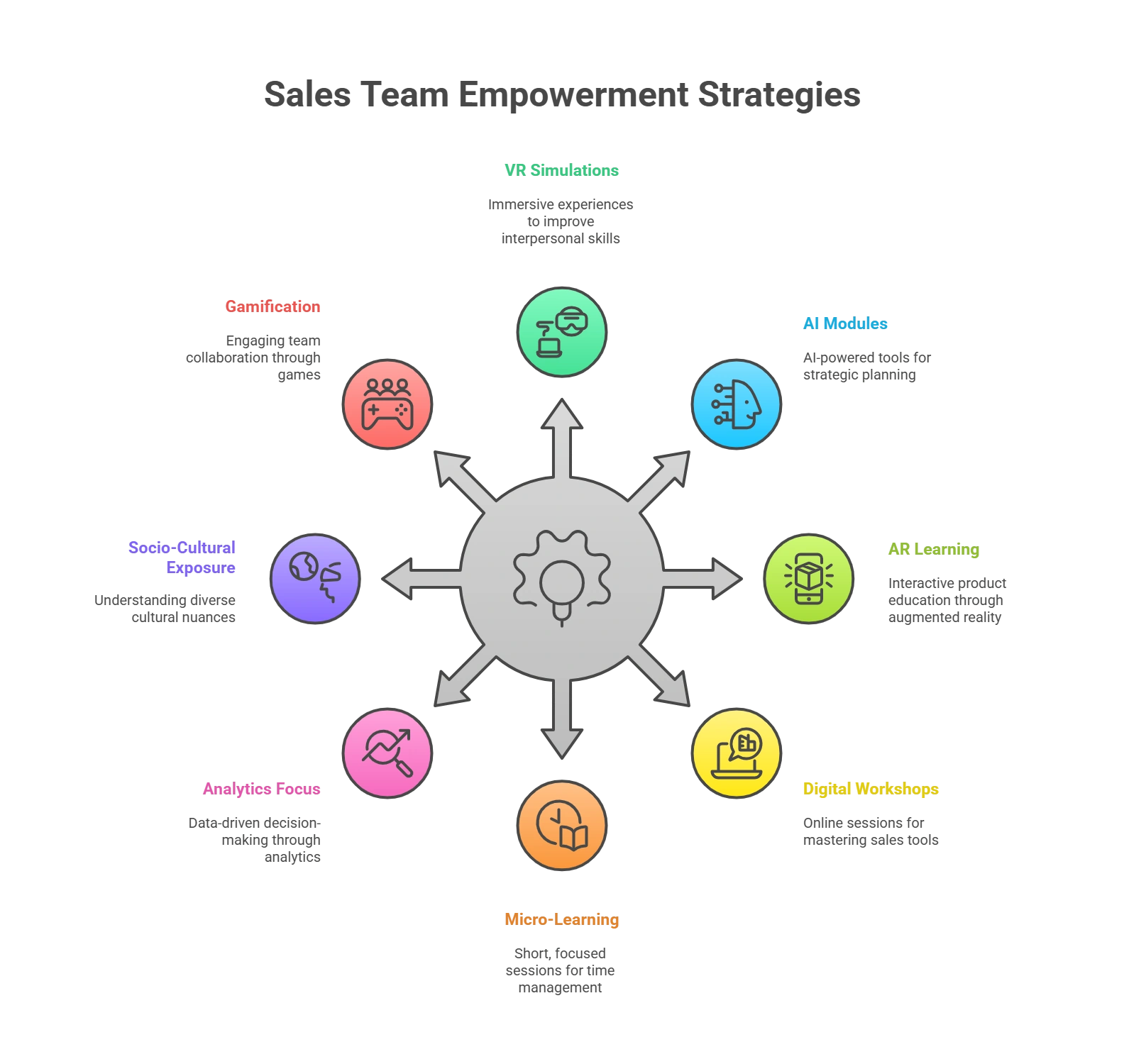
Sales Training Reimagined: Ideas, Tools, and Proven Approaches
Summarize with:
Throughout history, businesses have relied on a specialized group of professionals, aka sales professionals, to promote their offerings and attract clients. In 2024, while their core objective remains unchanged, the responsibilities and numbers within sales teams have experienced exponential growth. About 72% of the company’s revenue comes from existing customers, with 28% coming from new customers. This means your sales training is directly responsible for holding down the fort for you during good times and bad. Over 76% of companies report a 6% to 20% increase in sales after implementing sales techniques and enablement initiatives.
With over 5.7 million sales professionals worldwide, their responsibilities have expanded beyond just selling products. Today, they must excel at delivering presentations, building relationships, and understanding their company’s offerings.
To meet these demands, companies are investing in training to empower their sales teams. In this article, we’ll explore eight simple yet effective ideas to enhance the skills of your sales team and keep them ahead in today’s competitive market. Let’s dive in!
Table of Contents:
- What is Involved in Sales?
- Challenges of Traditional Sales Training
- 6 Crucial Elements You Need in Your Sales Training Program Checklist
- Eight Key Training Ideas to Drive Sales Team Empowerment
- VR Simulations to Enhance Soft Skills
- Assistive AI Modules to Strengthen Strategy
- AR-Driven Product Learning
- Digital Workshops for Sales Tools Proficiency
- Micro-Learning for Time Management
- Focus on Analytics for Data-Driven Decisions
- Build Socio-Cultural Exposure
- Collaboration and Engagement through Gamification
- To Sum Up
What is Involved in Sales?
Before we discuss sales training, let’s first define what tasks fall under the scope of sales.
As mentioned earlier, sales are the art and science of a business, acquiring customers and connections, and delivering products or services. Here are the elements or tasks that fall under the field of sales:
- Prospecting: This element is all about identifying potential customers and initiating contact. During the prospecting process, sales professionals understand potential customers’ needs and preferences. Prospecting requires a keen eye for detail and marketing knowledge to identify customers who could bring in a steady stream of business and match their organization’s goals and values.
- Lead Generation and Pitch: The lead generation process falls under sales and involves converting prospects into active clientele through compelling presentations and persuasive sales pitches.
- Negotiations: As sales professionals also need to ensure their business meets profit targets, discussions on pricing and contracts come to the surface. This also includes negotiating an optimal deal with customers and creating a win-win arrangement.
- Relationship Management: Once a client is onboarded, customers are retained by maintaining high satisfaction levels and cultivating a solid relationship. Through effective relationship management, Sales professionals are often the bridge between the internal stakeholders and the clients themselves. Through these interactions, sales professionals ensure business continuity.
To say that sales professionals must constantly be on their toes is an understatement.
What Exactly is a Sales Training Program?
Fundamentally, a sales training program is the backbone for arming sales teams with vital insights, methodologies, and the latest industry trends to be the best at their jobs.
Whether your focus lies in traditional or remote sales training programs, the goal is consistent: enriching sales representatives’ grasp of your company’s offerings to drive tangible results and precisely cater to potential clients.
Furthermore, top-tier sales training modules go beyond mere product knowledge. It’s a holistic approach aimed at shaping a representative’s behavior, refining sales techniques, and instilling ethical sales practices.
Without an effective sales training program, your sales team might spread false information about a product, driving potential customers away and damaging your company’s reputation.
To avoid this scenario, you need to ensure your sales representatives are trustworthy and experts in their fields. This is where sales training comes in—fostering a culture of continuous learning and sales skills development.
Challenges of Traditional Sales Training
Organizations have employed traditional sales training methods with great success over the years. They have been altered and adopted as the business landscape has evolved. However, over the past decade, things have moved much too rapidly.
As such, traditional sales performance improvement programs now face multiple challenges:
- Expense: Traditional sales productivity improvement courses are expensive. They are conducted in person, which includes travel and other logistics. Today, this approach no longer makes sense.
- Time-Consuming: As physical presence is a requirement, hours must be dedicated to training, which means the sales force is away from the job for prolonged hours. To avoid this, the programs are often rushed, leading to poor retention.
- Rigid Structure: Traditional sales effectiveness improvement programs have a rigid curriculum. It does not consider the diverse needs, roles, and geographic predicaments of individual employees, often rendering them largely ineffective.
- Limited Opportunities: These programs do not allow people to revisit any doubts they may have, and there is limited opportunity to test out their newly acquired knowledge.

6 Crucial Elements You Need in Your Sales Training Program Checklist
Developing a successful sales training program from scratch will require meticulous preparation and strategic planning. Your goal should be to build a sales training curriculum that encompasses:
- A scope for identifying and tapping into new sales avenues.
- Strategies geared towards amplifying sales figures and boosting organizational efficiency.
- A roadmap for refining and leveraging your team’s current expertise and skills.
However, it’s important to remember that a sales training program isn’t “one-size-fits-all.”
Every company must customize its program to provide sales reps with the best resources and tools to deliver results and meet their goals.
When sales professionals adeptly merge their selling understanding with the resources provided through sales enablement tools, the result is a team geared toward success.
But to get your team to sales readiness and devise a potent training program, follow these six key pillars of sales training:
1. Essential Skills Assessment
Navigating the world of sales without a robust sales training curriculum is like sailing without a compass—risky business!
For an in-depth understanding, it’s essential to incorporate sales training modules on the following topics:
- Lead Generation
- Sales Funneling
- Drafting Proposals
- Negotiations
- Upselling and Cross-Selling Strategies
- Maintaining Communication with Clients After Closing Deals
Even if you’re onboarding an experienced sales professional into your team, revisiting these principles not only aligns them with your company’s objectives but also reinforces the core values that drive your organization’s success.
2. Sales Processes and Product Training
Another essential item on your sales training program checklist is acquainting employees with your company’s distinct sales methodology.
While experienced sales professionals bring a wealth of techniques to the table, aligning them with your organization’s specific approach is essential. Hence, your sales training program is an excellent way to familiarize them with your preferred methodologies, from engaging prospects and crafting compelling pitches to guiding customers seamlessly through the sales journey.
Incorporating real-world simulations, such as role-playing exercises, can elevate this learning experience, making it both practical and impactful. As part of your training, empower your team with comprehensive insights into your offerings, filling them in on all the unique features that set you apart in the marketplace.
To facilitate continuous learning, consider establishing a Just-In-Time (JIT) product information library. This performance support tool ensures that your sales professionals have immediate access to critical product details, fostering confidence and competence at every customer interaction.
Moreover, in the dynamic landscape of products/services, client behaviors, and overarching industry shifts, staying stagnant isn’t an option. In such cases, you can utilize micro-learning techniques to upskill your sales team and ensure they’re always aware of these changes.
3. Understanding the Customer Experience
Gaining insight into the sales journey from the customer’s perspective is another crucial element to incorporate in your sales training program.
Your training approach should put your sales team in the customer’s shoes to gain a holistic understanding of the sales process. By meticulously guiding them through every phase of the customer journey, you prepare them not only to anticipate potential hurdles but also to address them proactively.
This ensures your team is well-prepared to navigate challenges with finesse.
4. Fundamental Soft Sales Skills Training
As the work landscape shifts towards remote interactions, you must equip your sales team with essential virtual and hybrid soft skills training techniques.
For instance, emphasize the importance of maintaining eye contact by looking directly into the camera rather than at the screen. Additionally, train them on how to speak clearly and effectively during Zoom meetings, as such interactions differ from face-to-face conversations.
While some sales training techniques remain consistent for both online and in-person interactions, others demand adaptation. Provide your team with actionable tips for online calls, enhancing their confidence and proficiency with clients, irrespective of geographical boundaries.
5. Alignment of Business and Training Goals
Your training program will be incomplete if your sales goals do not align with those of your business goals. Moreover, don’t force your employees to enroll in myriad training courses unless they resonate with their professional goals and your organizational goals.
Proactively assess your team’s skills, identify knowledge gaps, and align them with your business goals. This strategic alignment enables you to select training initiatives that drive tangible value.
Moreover, when employees recognize the direct impact of skill enhancement on their performance, their motivation to elevate their expertise surges naturally.
6. Team-Building Activities
Lastly, incorporate group activities into your training program. This will help your newly recruited sales reps bond with their colleagues as they learn new skills and techniques.
Spice things up by shuffling the group dynamics, allowing team members to get to know most of their new coworkers.
While we’re laser-focused on sharpening those business skills, let’s not forget the fun quotient! Throw in a social activity or a delightful outing every so often. After all, a team that bonds over a bit of fun is primed to conquer the sales universe with flair.

Eight Key Training Ideas to Drive Sales Team Empowerment
Sales team empowerment revolves around equipping professionals with the tools and skills necessary to take ownership of their roles effectively. Here are eight training ideas that can empower every sales professional:
1. VR Simulations to Enhance Soft Skills
Virtual Reality (VR) emerges as a transformative tool in the learning landscape, offering immersive experiences conducive to experiential learning. Through VR simulations, sales professionals engage in lifelike scenarios, donning headgear to immerse themselves in specific environments.
If organizations input algorithms that predict different reactions and dialogues, it also strengthens the sales enablement practices needed to handle clients effectively. This eventually increases the chance of converting a potential lead into a solid sale in real-world settings.
2. Assistive AI Modules to Strengthen Strategy
One key advantage of assistive AI is that it can adapt a learning module or practice session to strengthen areas of improvement. Organizations embracing AI into their training methodology can personalize content and boost sales skills enhancement according to the unique needs and strengths of every sales professional.
The AI-powered learning module uses available performance data and historical sales data and measures it against key performance indicators to adapt upcoming content in real-time. This training module boosts sales team empowerment by improving different approaches and equipping the team with multiple foolproof strategies.
3. AR-Driven Product Learning
A sales team’s working area is often closer to potential leads and their current client portfolios than to where their products or services originate. This creates a gap between their product knowledge and technical depth.
Using Augmented Reality (AR) solutions, learning modules digitally project intricate working details of the products and services that the sales team offers to their clients. This allows a sales professional to gain instant access, boost their knowledge, and effectively convey its benefits and scope of use to potential clients.
4. Digital Workshops for Sales Tools Proficiency
Conducting workshops has become a crucial upskilling method in organizations. With technology constantly developing numerous sales tools, upskilling individuals to be adept at using them is paramount.
Through digital workshops, many professionals can learn how to incorporate these trending gadgets to improve their daily tasks. Whether it’s using video conferencing platforms to reduce travel time, leveraging document management systems like Google Workspace for enhanced accessibility and organization, or utilizing sales analytics tools such as Clari and Aviso to decipher market trends, these workshops serve as invaluable resources for empowering sales teams.
5. Micro-Learning for Time Management
In sales, time is precious. That’s where micro-learning comes in handy. It offers short, engaging lessons that fit into busy schedules. This method boosts retention and saves time, making it perfect for on-the-go learning between meetings. Plus, it’s cost-effective, helping sales teams sharpen their skills efficiently.
This approach to learning ensures that sales professionals can quickly grasp essential concepts without disrupting their workflow. Moreover, microlearning’s cost-effectiveness makes it an attractive option for organizations looking to optimize their training budgets while achieving tangible results.
6. Focus on Analytics for Data-Driven Decisions
Sales is a process that heavily depends on historical data and future sales trends. This means every sales professional must also be equipped to collect and interpret such information.
The ability to make data-driven decisions skyrockets through learning modules focused on data analytics. This process helps standardize the lead generation and conversion process with a scientific approach instead of pure gut instinct.
7. Build Socio-Cultural Exposure
Respecting cultural nuances and societal norms is crucial to the sales team’s empowerment journey. Embracing aspects such as regional laws, professional etiquette, cultural differences, and social perspectives has the potential to make the best impressions and build the strongest business relationships.
Through technologies such as AI-powered virtual simulations, delivering training modules to improve a team’s socio-cultural exposure significantly increases their global sales competence.
8. Collaboration and Engagement through Gamification
Incorporating gaming elements in training often significantly boosts a learner’s motivation and engagement levels. Rewarding learners for their achievements and exploring content in the form of games and levels also helps instill a competitive spirit amongst peers.
Gamified training isn’t just about sales team empowerment—it’s also about building stronger teams. When used together, these games encourage sharing, teamwork, and collaboration. It’s a simple way to improve skills while bonding as a team.
These ideas enhance the skills and knowledge of your sales team and boost a culture of continuous improvement and innovation within your organization. By implementing these ideas, you can empower your sales professionals to exceed targets, drive revenue, and stay ahead in today’s competitive market.
To Sum Up
Sales training remains crucial for a company’s success. Clearly, the traditional methods of corporate training now need an upgrade. eLearning mitigates the many challenges faced by traditional sales effectiveness improvement programs and has an incredible return on investment.
However, unless you have access to effective training content, the results may not be remotely positive. A reliable name in the workforce training business is Hurix Digital. They have everything you need to ensure your sales team’s professional development needs are met.
Hurix Digital leverages the power of artificial intelligence to create personalized eLearning content for your training needs. Their courses follow adaptive learning techniques, ensuring no individual is left behind. The course material was designed with practical application in mind, making it the perfect fit for a client-facing field such as sales.
If you want to invest in sales training for your organization, call Hurix Digital today and watch the revenue numbers fly!
Summarize with:

Senior Vice President
Julia brings over 20 years of global experience in digital learning and business strategy. She specializes in client success, enterprise learning solutions, and driving growth through innovation, with a focus on AI, VR, and emerging technologies across diverse industry verticals.
 A Space for Thoughtful
A Space for Thoughtful 



